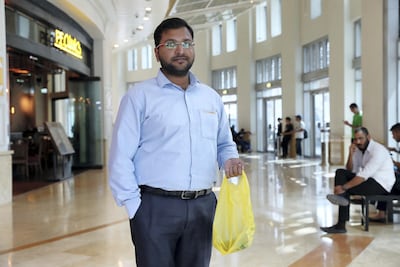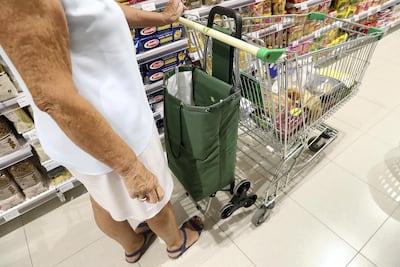Shoppers have urged supermarkets in the UAE to follow the lead of other countries and charge a fee for plastic bags or ban them altogether.
Dubai shoppers say that not enough is being done to encourage people to stop buying single-use plastic bags.
Countries such as New Zealand, where plastic bags are banned completely, Ireland and the UK, where customers have to pay for each bag, were held up as examples for UAE supermarkets to follow.
Some residents told The National that the culture in supermarkets across the emirates, where checkout staff fill up plastic bags with groceries as a matter of routine, was a big part of the problem.
“It’s never going to change here as long as there are staff packing your groceries for you into plastic bags at the checkout, free of charge,” said Australian Richard Barry, who has lived in Dubai for 44 years.
“Nowhere near enough is being done to discourage the use of plastic bags. If people had to pay for them then it wouldn’t be long until they started bringing their own bags from home.”
Some countries have gone as far as banning the distribution of plastic bags completely. New Zealand was the latest country to implement the policy in 2018, with retailers given six months to phase out plastic bags or risk fines of up to NZ$100,000 (Dh250,000).
Bangladesh was the first country to completely ban plastic bags in 2002, followed by China, Israel, South Africa, the Netherlands, Morocco, Kenya, Rwanda, Mauritania, Sri Lanka, Papua New Guinea, Vanuatu, Albania and Georgia.
Ireland was the first country to introduce a fee for plastic bags in 2002. Shoppers there are charged the equivalent of Dh1 per bag.
The UK also introduced a levy with customers having to pay the equivalent of Dh0.24 each time they want a plastic bag.
“People are just too lazy and they are going to do what’s easiest for them,” said Mr Barry.
“But if charges were introduced they would accept them just like they did in Australia, Ireland and the UK.”
Peter Jacobs, a Russian engineer based in Dubai, said he used plastic bags simply because it was the most convenient option.
“If a charge was introduced then, yes, I would pay it. I actually think it would be better if paper bags were offered as alternatives,” said the 27-year-old.
“I reuse the plastic bags as often as I can.”
Jithin Alex, 29, from India said that if supermarkets were going to distribute plastic bags free of charge then more should be done to provide recycling amenities that were convenient to reach.

It would be unfair to implement a plastic bag charge on people who were already finding it hard to make ends meet though, said South African Chonay Louw, 27.
“People just don’t like paying for stuff at the best of times,” said the retail manager who is based in Abu Dhabi.
“We need to change their mindsets first and educate them so there is an actual demand for plastic bags to be removed.”
The impact that plastic pollution is having on the world is devastating — it is responsible for the deaths of more than 1.1 million animals and seabirds each year. An estimated 8.3 billion tonnes of plastic pollution has been produced since the 1950s across the world, which is the equivalent of 16,600 Burj Khalifas.
Worldwide there are two million plastic bags used each minute, with the average time of use for each one being 12 minutes. It takes up to a thousand years for a plastic bag to decompose.

A plastic bag charge was previously trialed in the UAE by Waitrose in the second half of 2018, with shoppers charged Dh0.05 for each single-use plastic bag.
“We saw plastic bag usage reduce significantly with a 74 per cent reduction in the first two weeks of the trial,” said a spokesman.
“Feedback from customers was incredibly positive and highlighted the willingness of shoppers to make small changes to their behaviour to help bring about a positive effect on the environment.”
The trial was so successful that the company is looking at rolling it out across Waitrose and Spinneys stores in the UAE.
Customers at Carrefour can opt to buy from a selection of reusable bags ranging from Dh0.5 to Dh3 that come with a lifetime replacement guarantee.
“Customer data shows us that there is an increasing understanding of the importance of reusable bags,” said Philippe Peguilhan, country manager, Carrefour UAE.
“Sales of reusable bags are growing steadily, however, they are still lower than we would like.
“There is much more work to be done, and we need to help encourage our customers not just to buy the reusable bags, but to remember to bring them and reuse them.”
Mr Peguilhan ruled out charging a fee for single-use plastic bags here in the UAE, for now at least.
“In other markets, the concept of charging for plastic bags is mandated by legislation,” he said.
“In the UAE, we operate in line with local regulations that for now remain focused on incentivising customers to opt for reusable bags through alternative means.”
One innovation that Carrefour has introduced in the region is offering priority service to customers using reusable bags.
“We offer a priority checkout station for customers with reusable bags in some of our larger stores and have seen some success as a result,” he said.
A senior figure at the Lulu Group, another of the UAE's main supermarket chains, said they have no immediate plans to start charging for single use plastic bags.
“At present, we don't intend to charge for the regular single-use shopping bags,” said V Nandakumar, chief commercial officer, Lulu Group.
“However, we sell the reusable shopping bags for Dh2.75, which are replaced free of cost if damaged.”


